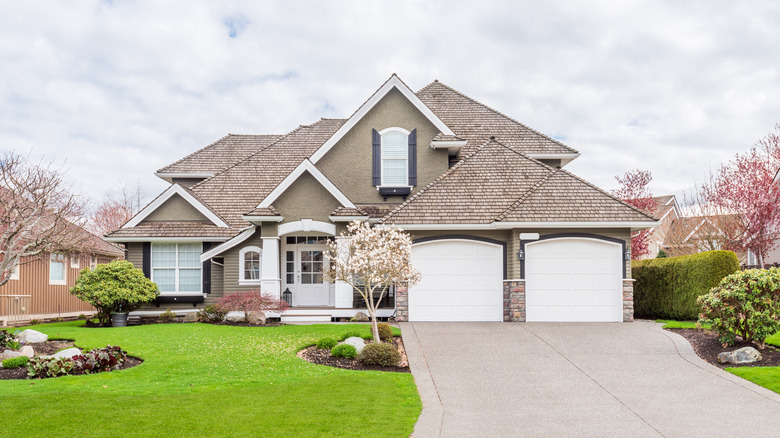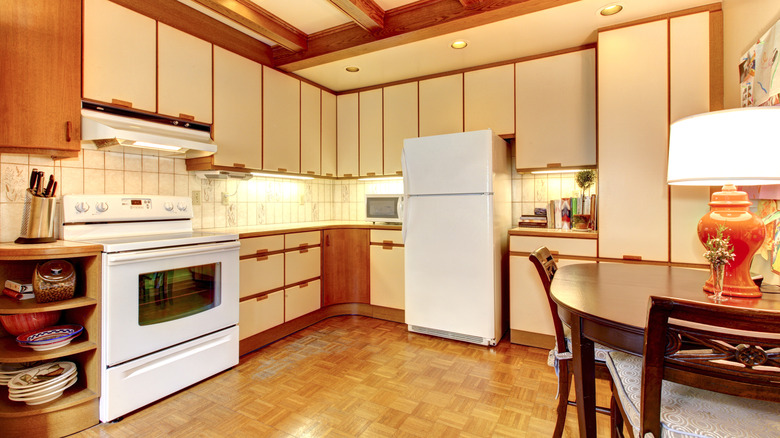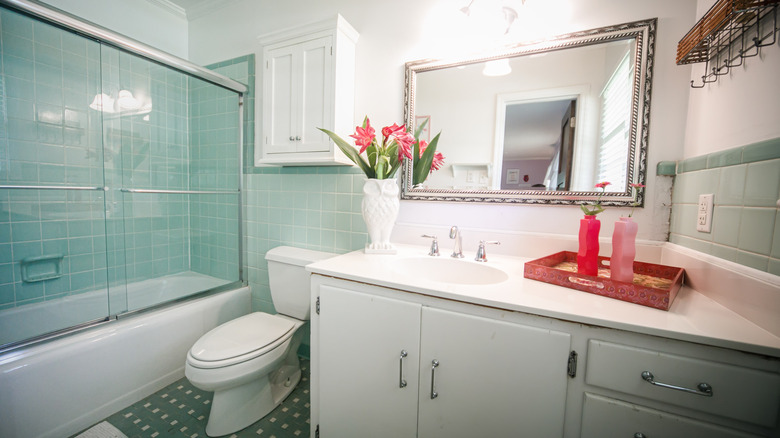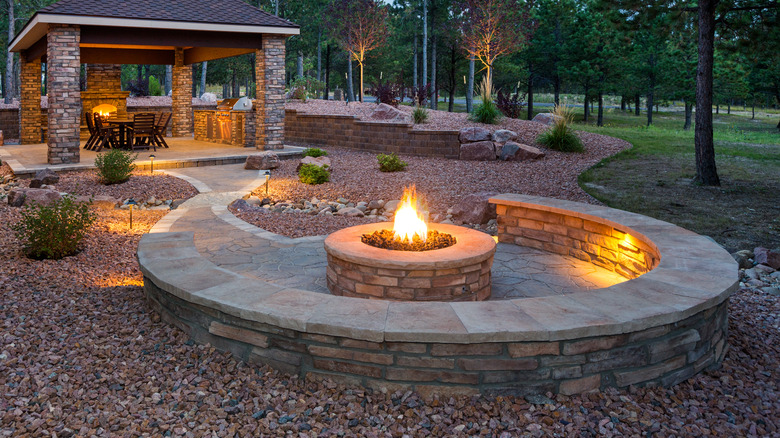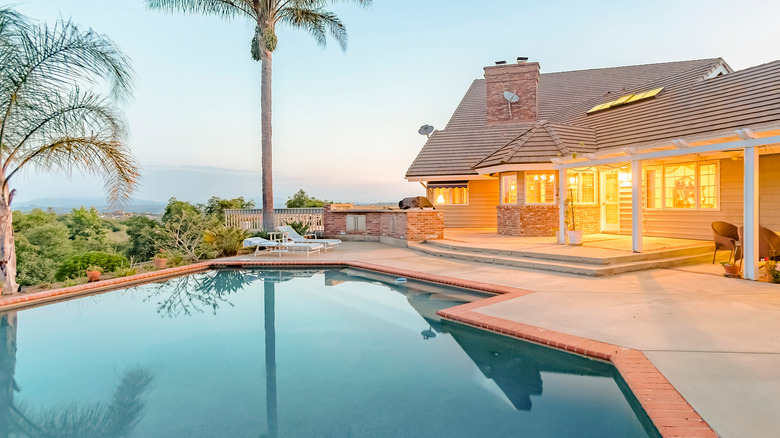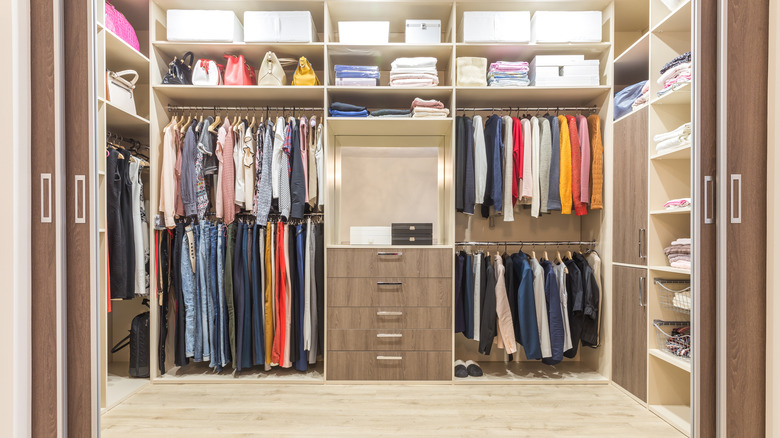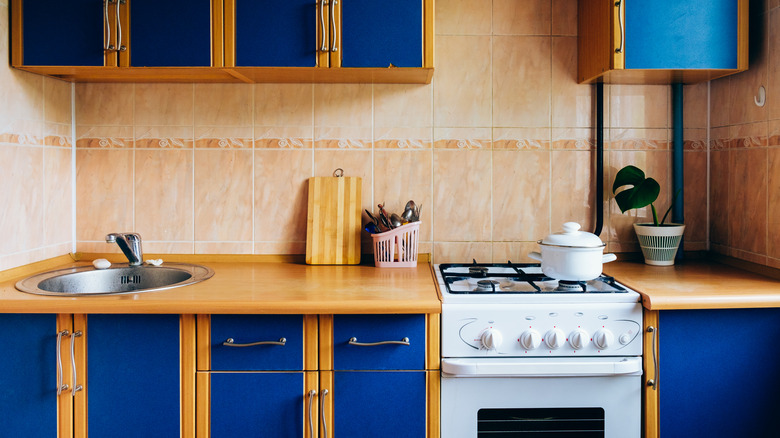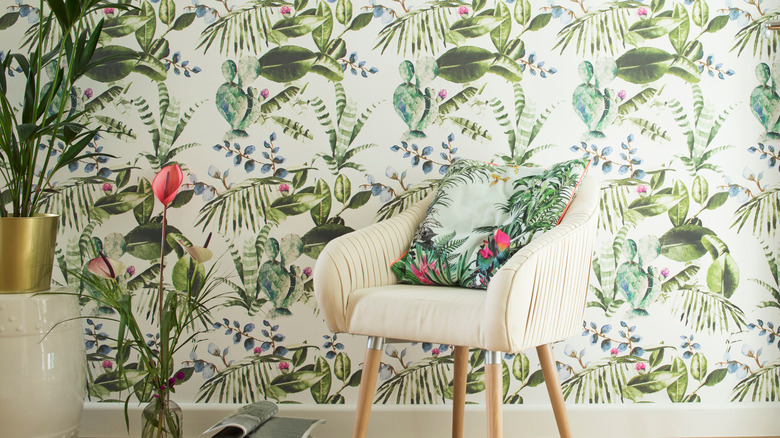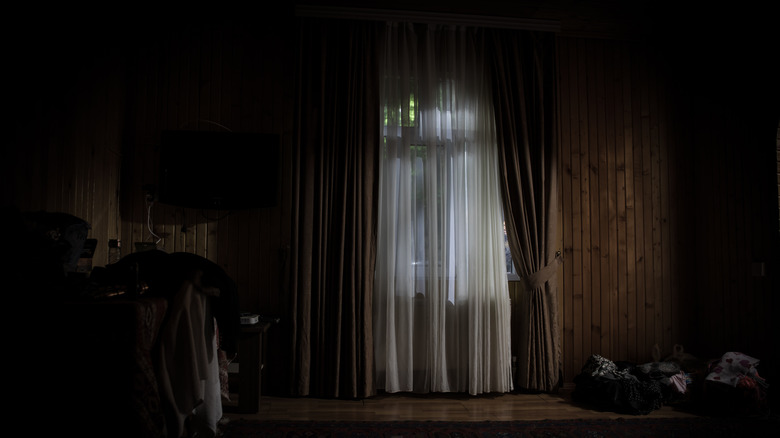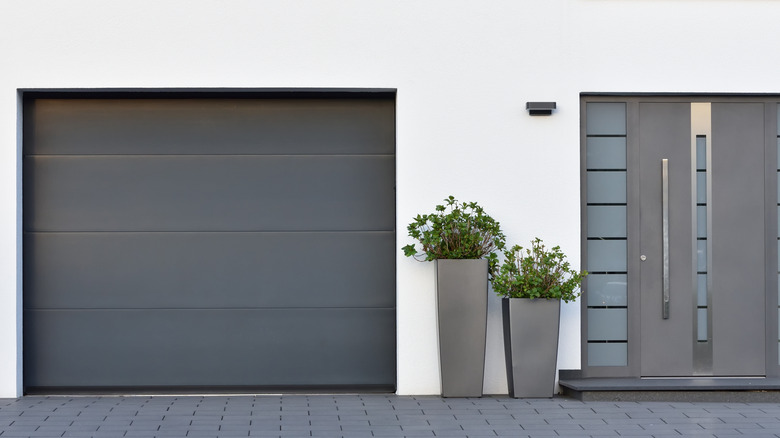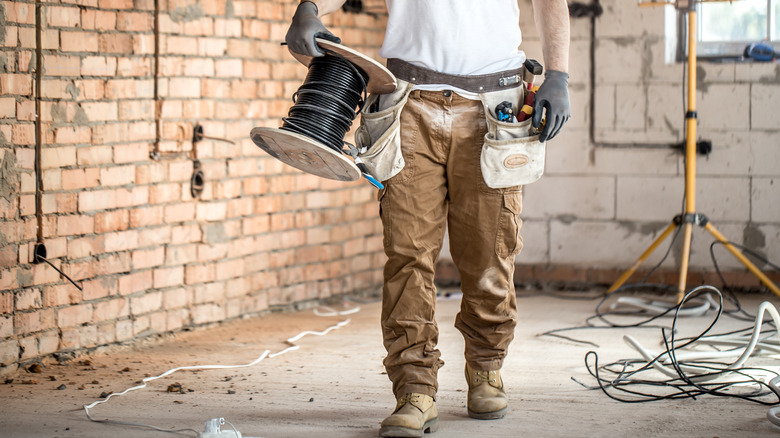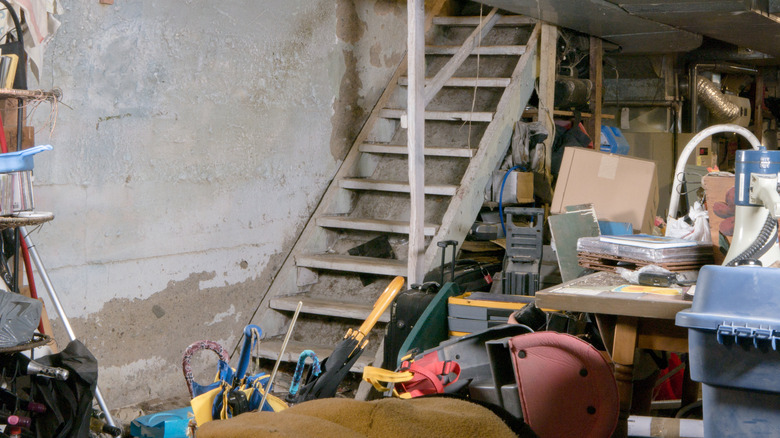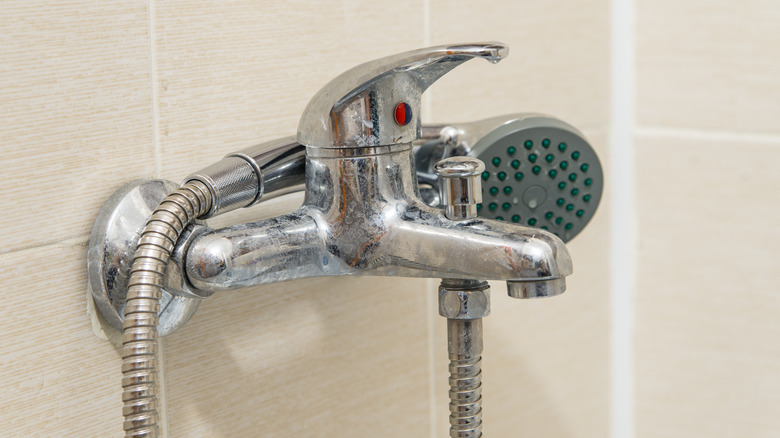Features That Could Wreck Your Home's Value
In a seller's market, where there are more home buyers than inventory in a given community, home sellers don't have to put much work into creating an appealing home. But when the equation flips, as it inevitably does, sellers will need to think about how their home competes with every other house for sale in their community and in their price range.
Home buying is serious business, with sellers looking to maximize their price and buyers seeking reasons to negotiate downward. What does this mean for sellers? Gene Szpeinski, a Michigan realtor with 45 years of experience representing residential clients, told House Digest that, when visiting your house, "the buyer is looking at what they devalue as much as what they value." This means the decisions you make now can drive up or down that value in the future.
So how do you protect your home investment? Look no further for the answer. Here are some features in your house that could wind up wrecking your home's value.
Outdated kitchen
Your vintage kitchen might suit your tastes just fine, avocado-hued appliances and all. But if maintaining your investment is important to you, smart updates are important.
Personal finance advisor and media personality Dave Ramsey addressed kitchens and their relationship to home value in a recent blog post. He says that, not surprisingly, kitchens are very important to buyers. Real estate site Trulia says that the kitchen is a buyer "hot spot" and a "make it or break it" feature when it comes to home selling.
According to Remodeling magazine, kitchen remodels cost, on average, between $23,452 (for a minor, mid-range remodel) and $135,547 (for a major, high-end remodel). Expensive? Yes. However, this work will make your house more appealing when it goes on the market, and you can expect to recoup about 77 percent of the cost of the mid-range remodel and 54 percent for the major upscale renovation.
Ramsey cautions against over-improving the kitchen, however. You'll recoup less of your cost if your kitchen is vastly nicer than anything else in your neighborhood.
Outdated bathrooms
It probably comes as no surprise that bathrooms are another room potential buyers tend to focus on. This is especially true of the master bath, according to Trulia, which explains that buyers like clean lines and modern amenities such as soaking tubs and dual vanities.
Speaking to HomeLight, California realtor Andrew Oldham cautions homeowners not to use their entire reno budget on just one bathroom, however. Invariably, he says, buyers will forget the perfect bath, while the outdated, hideous powder room will stick in the their memory.
Another HomeLight blog post says the best return on investment when it comes to bathrooms are vanities (including the countertop, faucets, and sinks), flooring (buyers currently like ceramic or porcelain tiles or vinyl that mimic the look of wood while still being waterproof), and upgraded, walk-in showers, plus a soaking tub if space allows.
Trulia advises making the most of the existing footprint of the bath, and try to salvage what you can while still making upgrades buyers will appreciate. Update the faucets and lighting and add new mirrors and towel racks if a new shower, tub and toilet aren't in the budget.
Landscaping missteps
To maintain your home's value, it's important to regularly tidy up and edge the planting beds, eliminate weeds, and trim overgrown trees and shrubs. But while that's all common sense, did you know there are landscaping features that can actually decrease your home's worth?
Like your interior, it's hard to achieve appealing results outside without good design. If your landscaping seems "off," it's probably due to a lack of an overall plan, and a professional can help. BobVila.com, it's important to start with an overall vision and layout for your landscaping. Some garden center centers provide minor design consultation at no charge if you purchase plant materials from their store.
Experts advise that big-budget items like a patio pizza oven or fire pit could also turn off buyers. While you might see cozy nights by the fire, a potential buyer might see a hazard to children or expensive maintenance costs.
Homeowners should also beware of the "concrete jungle" effect, says the BobVila.com article. While buyers like a patio or deck, it should be proportionate to the size of your yard and softened with landscaping.
Carpeting
Carpeting is a feature you should replace if you're planning on selling your home any time soon. Not only is carpeting outdated as a design choice in general these days, but buyers are averse to it for its ability to trap allergens and difficulty to clean. In its blog, HomeLight, makes the point that while some buyers will overlook carpeted bedrooms, they definitely seem to prefer seeing hardwood on the common areas of the house like the entryway, living room, and kitchen. A survey conducted by the National Association of Realtors and USA Today revealed by that 54 percent of home buyers were willing to pay more than $2,000 for homes with hardwood flooring.
Hardwood is expensive, but it's expected from buyers of high-end homes. According to HomeLight, certain types of hardwoods add more value than others, and the current trend leans toward those in a rustic-chic style, such as those that are hand-scraped, salvaged or have an antiqued or vintage feel.
For more mid-priced homes, sellers can get away with less-pricey wood-look laminate, Michigan realtor Gene Szpeinski told us. Moreover, consistency from room to room is key. According to HomeLight, a single hard flooring surface that flows from room to room is ideal. A patchwork of different floorings from room to room is unappealing.
Pools and spas
Unless you live in a climate where they can be used year-round, or in a high-end community where such amenities are expected, pools and spas can actually decrease your home's value.
Financial advisor and media personality Dave Ramsey writes on his blog that many buyers put pools squarely in the "cons" column when judging a house, seeing them not as a luxury, but as hazardous, obtrusive and expensive to maintain. These hazards are of greatest concern to home buyers. In the summer, the news is full of terrifying stories of children drowning in residential pools. In fact, The Consumer Products Safety Commission reports that there are 379 residential pool drownings each year in children younger than 15. Understandably, many parents and non-parents will veto any property that comes with a pool or even a hot tub.
Home buyers are also leery of the expense posed by a pool. Ramsey tallied up the numbers: Maintaining a pool might increase your utility costs by $100 per month, tack on an additional $1,000 per year in professional pool opening and closing costs, and then another $600 per season in chemicals.
The bottom line: for most homes, a pool will have a detrimental effect value and make it harder to sell.
Anything that removes a bedroom
While the idea of an expanded master suite, a walk-in closet, or a luxury bath might sound appealing, taking out a bedroom to achieve your remodeling dreams could seriously harm your home's value.
MarketWatch points out that there are buyers who simply won't consider two-bedroom or three-bedroom homes, so reducing the number of bedrooms limits the pool of potential buyers for your home. Similarly, if you work from home and want to convert a bedroom to a home office, leave the closet intact, because rooms without closets cannot be marketed as bedrooms in real estate listings.
An article on real estate site Home Bay says that removing a bedroom is especially risky if you live in an area that attracts multigenerational families. They advise homeowners to make non-non-permanent changes that allow you to use the space in a way that suits your lifestyle, such as treating a spare room as a walk-in closet or dressing room, without actually making structural changes.
Taste-specific design
Try not to over-personalize your space in any permanent way if maintaining your home's value is important to you. In its blog, the property management company Decas Group points out that people have a wide variety of tastes, both in what they like and what they hate. While a Southwest motif or beachside cottage decorating scheme might be what you like, such "themes" will alienate more people than they attract.
Your best chance to appeal to the broadest swath of potential buyers is to keep things as neutral as possible, because the more people who can envision themselves in your space, the better. Consider avoiding ornate chandeliers, colorful or patterned tiles or tile mosaics, unusual sinks, or countertop patterns or colors. Instead, keep things simple.
According to home builders The Dean's List Group, while bold choices, while they might seem beautiful, they could be seen by buyers simply as something that will cost time, money and work to undo. Instead, choose whites and other neutrals when it comes to permanent, expensive upgrades and projects. Put your personal touches in furniture, pillows, rugs, and other accessories.
Water features
Fountains, ponds, waterfalls...many people find the look and sound of water features appealing. But depending on the type of property you own, these might be a detriment to your home value.
Realtor Gene Szpeinski told House Digest: "Like a pool, it depends on the lifestyle of the person buying your property." Translation? In a neighborhood appealing to young families, a feature like a pond might keep your house on the market longer than you'd like.
Homelight points out that any water feature requiring maintenance and upkeep will turn off many buyers. Also, some water features mean extra costs, such as those associated with cleaning and water usage. Both fountains and waterfalls need to be cleaned and have filters that must be replaced. They also require chemicals to prevent algae.
The bottom line: while a feature like a koi pond might be your idea of backyard paradise, many buyers could see it as a hazard, an expense, or an extra Saturday chore.
Wallpaper
When it comes to wallpaper, buyers pretty much don't want it — even if it's new and no matter how tasteful, expensive, or chic that wallpaper might be. According to Realty on Top, before you think of selling you house, you should probably remove it. Your wallpaper pattern will be far too taste-specific to appeal to a wide group, the company explains. Moreover, buyers don't want the project of removing old wallpaper, a process that can damage drywall and lead to additional repairs, projects and expenses. The Decas Group explains in its blog that home buyers see wallpaper and think wonder two things: How much time and money it will cost to remove it, and, whether the wallpaper is hiding problems with the drywall or sheetrock beneath it.
It should go without saying that the same goes for wood paneling, no matter how much you love it. Because it's largely out of fashion, the majority of buyers will only see another project and expense.
Finally, don't forget the "fifth wall." If your ceilings have a popcorn texture, it's well past time to "unpop" it. That advice comes with a word of caution, however. Many "popcorn" ceilings contain asbestos. Bob Vila recommends that if the ceiling pre-dates the late 1980s, consult with an expert before removing.
Dark Rooms
Good lighting can highlight your home's best features, make your rooms seem larger than they are, and make the house feel more welcoming to potential buyers, according to Coldwell Banker Grass Roots Realty.
You can increase the natural light in your home by removing heavy drapes. In addition to ambient ceiling light, aesthetic lighting is important in living rooms, dining rooms, bedrooms, and entryways to create a mood and draw focus to architectural features such as bookshelves or artwork. Ambient light, which can complement the main light source, can come from lamps, wall sconces, and recessed lights.
Task lighting is required for rooms like the kitchen, bathrooms, or home office for specific purposes like cooking, applying makeup, or doing paperwork. This kind of lighting focuses light on the countertops, sinks, or desk.
Richmond American Home Builders suggests doing a room-by-room "light audit" of your home at different times of the day to assess problem spots and add lighting or mirrors to reflect natural light. If your ceiling is covered in shadows, the company says a ceiling fixture, track lighting, or pendants will fix it.
Garage conversion
While it might seem like an easy way to add livable square footage to your house, think twice before converting your garage into living space. Realtor.com acknowledges that while many people use their garage for storage rather than their intended purpose (parking cars), a garage is still a buyer must-have. The group's research revealed that for 27 percent of home buyers, a garage is one of the most important features they want in a home, outranking even a new kitchen and an open floor plan.
In areas where parking spaces are scarce, sacrificing a garage is a big mistake. In Midwestern cities where winters are harsh, garages add the most value to a home, according to Real Trends. Parking spaces, including garages are also important in cities where parking is at a premium, including New York, Washington, D.C., and Boston.
Converting a garage in a rural area doesn't make sense either, as people expect garage space both for cars and recreational gear.
Sacramento broker Erin Stumpf says that a garage conversion makes sense if it is done well and there is still available garage parking. However, it will detract from your home's value if your parking situation doesn't match that of your neighbors.
Anything built without a permit or not to code
Who needs a permit? You do. When doing a DIY home improvement project, you might be tempted to skip the extra expense and hassle of obtaining the proper local permits. Resist this temptation, says HomeLight because skipping this step might save you a few hundred dollars in the short term, but cost you thousands in the long run in unrealized appreciation.
Consider this: home additions completed without a permit are illegal and can not be counted as added square footage when the home is appraised. This alone diminishes your investment. Potential home buyers will also take advantage of non-permitted improvements by negotiating a lower price, contending they will need to file for a permit retroactively or assume the risk of living with unapproved and potentially dangerous updates.
Moreover, HomeLight contends, any damage that ensues from non-permitted construction or code violations (such as burst pipes or electrical fires) voids your homeowners insurance. Definitely a bad investment.
Bad basements
A neglected basement — one with leaks, smells, moisture, cracks, or foundation problems — is another thing that can lower your home's value and its appeal to buyers. Moreover, Michigan realtor Gene Szpeinski told House Digest that structural issues with the basement could lead to issues on the main floors of your house, such as sloping floors above the basement or cracks in the drywall and plaster, damaging your investment even further.
What to do? First, fix any drainage problems around the foundation, as water is the root of many basement problems, including mold, mildew, and cracked walls and floors. Make sure your downspouts are in good repair and that water is directed away from your foundation or into a storm sewer.
Secondly, don't forget that your basement is part of your house and needs regular cleaning and maintenance, just like the upstairs. Regular attention to this often forgotten space will also help you notice small problems before they get bigger. Considering a finished basement? It's a good idea, according to Zillow. In addition to the extra living space for you and your family to enjoy now, sellers see an average 70 percent return on this investment.
Outdated fixtures
Dated light fixtures, door and cabinet hardware, and faucets: All of it hurts your resale value.
According to Money Crashers, you should replace any hardware that came from another design era.
You can do this slowly, spreading out the expense if you're not selling soon. Matching hardware throughout the house, such as doorknobs and hinges, bathroom fixtures — and even small details, such as the brackets that support handrails — makes your home look more finished to potential buyers.
HomeLight drives the point home, stating that updates like matching pulls and faucets look more pulled-together and modern. It's a small, inexpensive update that can make your home more appealing.
As for what finishes to choose? Brushed nickel is contemporary and neutral and appeal to many types of buyers. Oil-rubbed bronze has classic appeal, and making a trendy comeback is medium-polished brass. If you're unsure of what's trending in your area, check with a realtor to find out what buyers are looking for, advises HomeLight.
